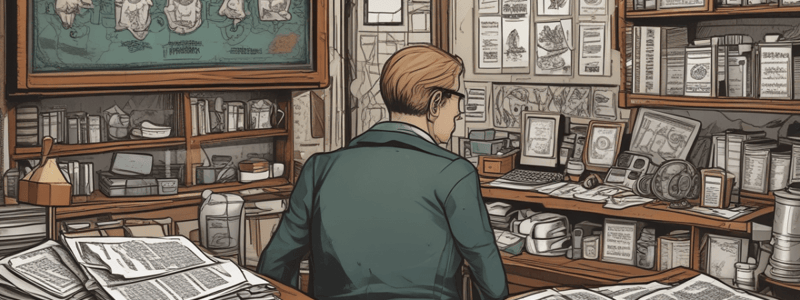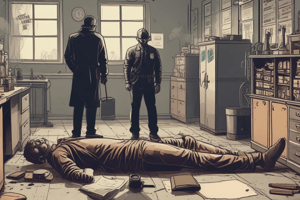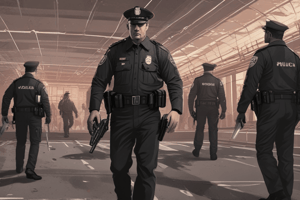Podcast
Questions and Answers
What is the primary consideration in determining the method of protecting evidence at a crime scene?
What is the primary consideration in determining the method of protecting evidence at a crime scene?
- The nature of the evidence being collected (correct)
- The number of personnel available
- The location of the crime scene
- The type of crime being investigated
Why is it necessary to position authorized personnel at a crime scene?
Why is it necessary to position authorized personnel at a crime scene?
- To allow the public to observe the investigation
- To secure the area and maintain the integrity of the evidence (correct)
- To take photographs of the scene
- To intimidate potential suspects
What is the primary purpose of crime scene tape?
What is the primary purpose of crime scene tape?
- To keep the public away from the investigation
- To intimidate potential suspects
- To mark the boundaries of a crime scene (correct)
- To display evidence to the public
Under what circumstances can an officer enter private property without a search warrant?
Under what circumstances can an officer enter private property without a search warrant?
What is the purpose of a crime scene log?
What is the purpose of a crime scene log?
Why is it important to determine if a crime scene is located on public or private property?
Why is it important to determine if a crime scene is located on public or private property?
What is the primary responsibility of the primary officer or investigator at a crime scene?
What is the primary responsibility of the primary officer or investigator at a crime scene?
What is the consequence for an individual who refuses to move behind the crime scene tape?
What is the consequence for an individual who refuses to move behind the crime scene tape?
Why is it important to separate victims, complainants, and witnesses at a crime scene?
Why is it important to separate victims, complainants, and witnesses at a crime scene?
What should you ask witnesses to do after they have been separated?
What should you ask witnesses to do after they have been separated?
What is one reason why multiple witnesses who have experienced the same event never recall the same details?
What is one reason why multiple witnesses who have experienced the same event never recall the same details?
What should you document in your notes during a crime scene investigation?
What should you document in your notes during a crime scene investigation?
Why is it important to ask the victim or complainant who was present during the crime to name any potential witnesses?
Why is it important to ask the victim or complainant who was present during the crime to name any potential witnesses?
What is one way to isolate people within one large room when separate rooms are not available?
What is one way to isolate people within one large room when separate rooms are not available?
Why may people who do not want to be involved in a crime scene investigation say little or nothing?
Why may people who do not want to be involved in a crime scene investigation say little or nothing?
What is an alternative controlled area to separate witnesses when separate rooms are not available?
What is an alternative controlled area to separate witnesses when separate rooms are not available?
What is the primary purpose of reviewing photographs immediately after taking them?
What is the primary purpose of reviewing photographs immediately after taking them?
Why is it recommended to avoid using an agency-issued cell phone camera to photograph a crime scene?
Why is it recommended to avoid using an agency-issued cell phone camera to photograph a crime scene?
What type of lighting is recommended when photographing shoe/tire impressions or tool marks?
What type of lighting is recommended when photographing shoe/tire impressions or tool marks?
Why is it essential to photograph perishable, transitory, or fragile evidence?
Why is it essential to photograph perishable, transitory, or fragile evidence?
What should you avoid including in crime scene photographs?
What should you avoid including in crime scene photographs?
What is the recommended distance for using a standard camera flash?
What is the recommended distance for using a standard camera flash?
Why is it important to keep extra batteries for both the camera and the flashlight?
Why is it important to keep extra batteries for both the camera and the flashlight?
What is the purpose of photographic framing in crime scene photography?
What is the purpose of photographic framing in crime scene photography?
What is an example of fruits of a crime?
What is an example of fruits of a crime?
What is the purpose of admissibility of evidence?
What is the purpose of admissibility of evidence?
What is an example of instrumentalities of a crime?
What is an example of instrumentalities of a crime?
What is the 'fruit of the poisonous tree' doctrine?
What is the 'fruit of the poisonous tree' doctrine?
What is an example of documentary evidence?
What is an example of documentary evidence?
What must be met before a jury can see or hear about the evidence?
What must be met before a jury can see or hear about the evidence?
What is an example of contraband?
What is an example of contraband?
What is a factor that affects the admissibility of evidence?
What is a factor that affects the admissibility of evidence?
What is the purpose of casting certain impressions at a crime scene?
What is the purpose of casting certain impressions at a crime scene?
Where can shoe or tire prints be found?
Where can shoe or tire prints be found?
What is the significance of bite marks in crime scene investigation?
What is the significance of bite marks in crime scene investigation?
What is a characteristic of patent prints?
What is a characteristic of patent prints?
What type of evidence can be found on all objects at a crime scene?
What type of evidence can be found on all objects at a crime scene?
What is the purpose of photographing bite marks?
What is the purpose of photographing bite marks?
What is the significance of latent prints in crime scene investigation?
What is the significance of latent prints in crime scene investigation?
What should be done with footprints, shoe impressions, and tire impressions at the scene?
What should be done with footprints, shoe impressions, and tire impressions at the scene?
What is the purpose of changing gloves between collecting each piece of evidence needing DNA analysis?
What is the purpose of changing gloves between collecting each piece of evidence needing DNA analysis?
What type of evidence includes human hair, animal hair, and textile fibers?
What type of evidence includes human hair, animal hair, and textile fibers?
What should be done with wet evidence, such as items soaked with body fluids or living plant material?
What should be done with wet evidence, such as items soaked with body fluids or living plant material?
Why is it important to handle specific types of evidence with special care?
Why is it important to handle specific types of evidence with special care?
What is the purpose of microanalysis in trace evidence?
What is the purpose of microanalysis in trace evidence?
What is the consequence of not changing PPE often enough?
What is the consequence of not changing PPE often enough?
Why is it important to place each piece of evidence collected for DNA analysis in its own, separate container?
Why is it important to place each piece of evidence collected for DNA analysis in its own, separate container?
What type of materials are suitable for packaging wet evidence?
What type of materials are suitable for packaging wet evidence?
What is the primary purpose of photographing perishable, transitory, or fragile evidence at a crime scene?
What is the primary purpose of photographing perishable, transitory, or fragile evidence at a crime scene?
Why should you avoid using an agency-issued cell phone camera to photograph a crime scene?
Why should you avoid using an agency-issued cell phone camera to photograph a crime scene?
What is the recommended lighting technique for photographing shoe/tire impressions or tool marks?
What is the recommended lighting technique for photographing shoe/tire impressions or tool marks?
What is the purpose of photographic framing in crime scene photography?
What is the purpose of photographic framing in crime scene photography?
Why is it important to review photographs immediately after taking them?
Why is it important to review photographs immediately after taking them?
What should be avoided when composing a crime scene photograph?
What should be avoided when composing a crime scene photograph?
Why should you keep extra batteries for both the camera and the flashlight?
Why should you keep extra batteries for both the camera and the flashlight?
What is the recommended distance for using a standard camera flash?
What is the recommended distance for using a standard camera flash?
What is the purpose of the good-faith exception doctrine?
What is the purpose of the good-faith exception doctrine?
What type of communication is protected by privilege?
What type of communication is protected by privilege?
What is the primary goal of a crime scene investigation?
What is the primary goal of a crime scene investigation?
What is the purpose of a preliminary investigation?
What is the purpose of a preliminary investigation?
What is the role of privileged communications in a crime scene investigation?
What is the role of privileged communications in a crime scene investigation?
What is the result of the good-faith exception doctrine in a crime scene investigation?
What is the result of the good-faith exception doctrine in a crime scene investigation?
What is the primary responsibility of the primary officer or investigator at a crime scene?
What is the primary responsibility of the primary officer or investigator at a crime scene?
What is the purpose of securing and protecting a crime scene?
What is the purpose of securing and protecting a crime scene?
What precaution should you take when collecting and packaging drug paraphernalia that includes sharp objects?
What precaution should you take when collecting and packaging drug paraphernalia that includes sharp objects?
What is a crucial step to take when you suspect a substance is fentanyl or carfentanil?
What is a crucial step to take when you suspect a substance is fentanyl or carfentanil?
What is a sign of exposure to fentanyl or carfentanil?
What is a sign of exposure to fentanyl or carfentanil?
What should you do if you encounter a large amount of powder suspected to be fentanyl or carfentanil?
What should you do if you encounter a large amount of powder suspected to be fentanyl or carfentanil?
What should you do when transporting a suspected fentanyl or carfentanil substance?
What should you do when transporting a suspected fentanyl or carfentanil substance?
What is the purpose of marking a package as 'suspected fentanyl'?
What is the purpose of marking a package as 'suspected fentanyl'?
Why is it important to have another officer nearby when conducting a field test for fentanyl or carfentanil?
Why is it important to have another officer nearby when conducting a field test for fentanyl or carfentanil?
What should you do if you are exposed to fentanyl or carfentanil?
What should you do if you are exposed to fentanyl or carfentanil?
What is the purpose of numbering all photographs and filler photographs before presenting the array to the victim or eyewitness?
What is the purpose of numbering all photographs and filler photographs before presenting the array to the victim or eyewitness?
What is the difference between simultaneous and sequential presentation of a photo array?
What is the difference between simultaneous and sequential presentation of a photo array?
Who is responsible for selecting the authorized method of conducting the photo array?
Who is responsible for selecting the authorized method of conducting the photo array?
What is the purpose of obtaining a sworn statement from the victim or eyewitness regarding the lineup results?
What is the purpose of obtaining a sworn statement from the victim or eyewitness regarding the lineup results?
Why is it necessary to read standardized instructions to the victim or eyewitness before presenting the photo array?
Why is it necessary to read standardized instructions to the victim or eyewitness before presenting the photo array?
What should the victim or eyewitness do after receiving the instructions and before reviewing the photo array?
What should the victim or eyewitness do after receiving the instructions and before reviewing the photo array?
What happens if the victim or eyewitness refuses to sign the acknowledgment?
What happens if the victim or eyewitness refuses to sign the acknowledgment?
What is the purpose of agency policies and procedures regarding photo array presentations?
What is the purpose of agency policies and procedures regarding photo array presentations?
Flashcards are hidden until you start studying
Study Notes
Physical Evidence
- Physical evidence can be categorized into three types: fruits of a crime, instrumentalities of a crime, and contraband.
- Fruits of a crime are objects obtained by the defendant as a result of committing the crime, such as money stolen by a bank robber.
- Instrumentalities of a crime are items used by the defendant to commit the crime, such as a crowbar used by a burglar to gain entry into a building.
- Contraband is any property that is illegal for a person to possess, such as child pornography found on a computer.
Documentary Evidence
- Documentary evidence is anything written or printed that is offered to prove or disprove facts pertaining to a case.
- Examples of documentary evidence include bank records, medical records, and certified copies of driving histories.
Admissibility of Evidence
- Admissibility of evidence refers to the legal requirements that must be met before a jury can see or hear about the evidence.
- The evidence must be deemed relevant and reliable, and the court must receive it.
- Admissibility of evidence protects the defendant's constitutional rights, guards the jurors from being misled or confused, and can expedite a trial.
- The officer must obtain the evidence legally and preserve it properly.
- The evidence must be relevant to the case and cannot be unfairly prejudicial, confusing, or based on hearsay.
Crime Scene Investigation
- Recognizing threats to the evidence will determine the appropriate method of protection.
- Different crime scenes may require different methods of protecting the evidence.
- In outdoor crime scenes involving degradable, easily destroyed, biological, or trace evidence, protect the evidence from weather elements.
- Instruct people to move behind the crime scene tape, advising that refusal may result in arrest.
Securing and Protecting a Crime Scene
- The primary officer or investigator will designate a point of entry and exit and assign an officer to maintain a crime scene log at that location.
- Determine if the location is public or private property.
- A person occupying private property has an expectation of privacy that no one can violate without a search warrant or a valid exception to the warrant requirement.
Questioning Witnesses at a Crime Scene
- Identify who to question at a crime scene, including victims, complainants, and witnesses.
- Separate involved people to prevent them from coordinating their accounts of what happened.
- Place people in separate locations, near the crime scene area, but in a place that poses no risk of contaminating evidence.
- Document the names, dates of birth, genders, races, addresses, and telephone numbers of all people involved.
Documenting a Crime Scene
- Use proper lighting to ensure that photographs are neither too dark nor too light to see details.
- Avoid including bystanders, other officers, equipment, or pets in crime scene photographs.
- Photographing perishable, transitory, or fragile evidence ensures its documentation and preservation.
- Examples of perishable evidence include blood, footprints, and tire impressions, or trace evidence, such as hair or fibers.
Impression Evidence
- Footprints, shoe impressions, and tire impressions at the scene can link a suspect to a crime when they match an object in the suspect's possession.
- Teeth can provide dental evidence in the form of bite mark impressions that can lead to the identity of the suspect.
- Photograph bite marks as soon as possible with a scale or identifier.
Fingerprints
- Consider all objects at a crime scene as possible sources of fingerprints.
- Patent prints are visible prints formed from the friction ridges or corrugated lines on fingers.
- Plastic prints are molded or embedded fingerprints created by touching an impressionable surface.
- Latent prints are invisible to the naked eye, but result from body residues left behind when the friction ridges of the hands or feet make contact with a surface.
Crime Scene Investigations
- The good-faith exception doctrine allows evidence to be admissible in court even if the search warrant is later found to have a legal error, as long as the officer executing the warrant believed it was valid.
- Privileged communications are protected from disclosure, including interactions between a sexual assault counselor and a sexual assault victim, and a domestic violence advocate and a domestic violence victim.
Securing and Protecting the Crime Scene
- The purpose of an investigation is to determine what happened, identify and locate the suspect, and develop evidence to establish probable cause for an arrest.
- The preliminary investigation focuses on establishing whether a criminal act has been committed and, if so, what type, when, and where it was committed.
Documenting the Crime Scene
- Photographs should be taken to ensure that they are in focus and have proper lighting to avoid glare and flashback.
- Use a flashlight or vehicle spotlight for enhanced lighting, and consider flood lighting for overall pictures.
- Photographic framing is important to depict what you are trying to document, and avoid including bystanders, officers, equipment, or pets in crime scene photographs.
- Use a camera with a flash, and avoid using a personal cell phone camera or agency-issued cell phone camera.
Photographing Evidence
- Perishable, transitory, or fragile evidence should be photographed to ensure its documentation and preservation.
- Examples of perishable evidence include blood, footprints, and tire impressions, or trace evidence like hair or fibers.
- Transitory evidence is evidence that can blow or wash away.
Collecting and Packaging Evidence
- Change gloves between collecting each piece of evidence needing DNA analysis to prevent cross-contamination.
- Use proper tools, equipment, containers, and packaging to prevent contamination and degradation of evidence.
- Place each piece of evidence collected for DNA analysis in its own, separate container.
- Use breathable containers like paper bags for wet evidence, and avoid packaging wet items improperly.
Trace Evidence
- Trace evidence is small quantities of material transferred from a victim or suspect to each other or to a crime scene.
- Examples of trace evidence include human hair, animal hair, textile fibers, rope, feathers, soil, glass, and building materials.
- Microanalysis is the process of analyzing trace evidence with a microscope to determine a possible source or origin.
Chemical and Toxicological Evidence
- Identify controlled substances and drug paraphernalia by sight or odor, and use field test kits to test substances before collecting and packaging them as evidence.
- Package sharp objects like needles or syringes in puncture-proof packages clearly labeled with "WARNING: SHARPS."
- Use PPE when encountering chemical or biological substances.
- Be aware of hazardous substances like fentanyl or carfentanil, which can be absorbed through mucous membranes.
Photo Array Presentations
- Number all photographs and filler photographs used in the array before presenting the array to the victim or eyewitness.
- Simultaneous presentation occurs when the independent administrator presents a group of photographs to the victim or eyewitness all at once.
- Sequential presentation occurs when an independent administrator presents individual photographs to the victim or eyewitness one at a time.
- Agency policies and procedures will specify which method is authorized.
Studying That Suits You
Use AI to generate personalized quizzes and flashcards to suit your learning preferences.



